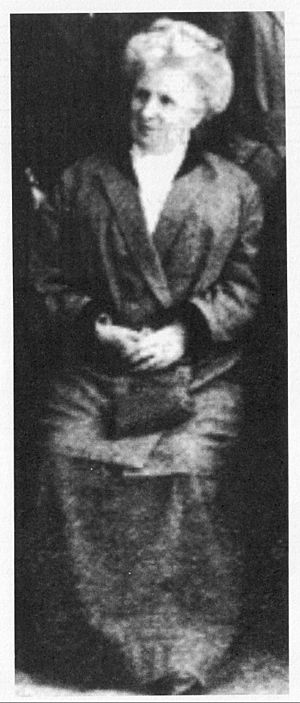Concepción Saiz Otero facts for kids
Concepción Saiz Otero (born May 22, 1851 – died March 1934) was an important Spanish teacher and writer. She was also a pedagogue, which means someone who studies how to teach. Concepción strongly believed that girls and women should have the same chances to get a good education as boys. She worked hard to make this happen throughout her life.
Contents
Who Was Concepción Saiz Otero?
Concepción Saiz Otero was born in 1851. She became a highly skilled teacher in 1878. Soon after, she took on a big role. From 1881 to 1884, she led the first special school for women. This school was part of an organization called the Association for the Teaching of Women. It helped women get advanced education.
Teaching in Madrid
In 1884, Concepción became a teacher at the Central Normal School for Teachers in Madrid. She taught there for many years, until she retired in 1921. She also shared her ideas at important meetings. These were called Pedagogical Congresses. She spoke at these meetings in Madrid in 1882 and 1892.
In 1909, she got another important job. She was chosen to be in charge of languages. This was at the new School of Higher Education Teaching. This school helped train teachers for higher education.
Concepción's Writings and Ideas
Besides teaching, Concepción Saiz Otero was a very active writer. She published many books and articles. Her writings often talked about teaching methods. She also wrote a lot about the importance of education for women.
Critiquing Old Education Methods
In 1895, she worked with Urbano González Serrano on a book. It was called Letters...Pedagogical? Essay of Pedagogical Psychology. This book looked closely at the old ways of teaching. It criticized teaching that just made students memorize things. Instead, they believed in teaching that made students think.
Her Most Famous Book
While her books about teaching were well-liked, Concepción is best known for another work. It was titled A National Episode Pérez Galdos Did Not Write: The 1868 Revolution and Feminine Culture. This book tells the story of how education for women changed in Spain. It shares her own experiences and the difficulties she faced as a woman working in education.
Later Life and Legacy
Concepción Saiz Otero retired from teaching in 1921. That same year, she received a special award. It was called the Cross of Alfonso XII. This award recognized her important work. Today, there is a street named after her in the city of Zaragoza. This shows how much she is remembered for her contributions to education.
See also
 In Spanish: Concepción Saiz Otero para niños
In Spanish: Concepción Saiz Otero para niños
 | Roy Wilkins |
 | John Lewis |
 | Linda Carol Brown |


